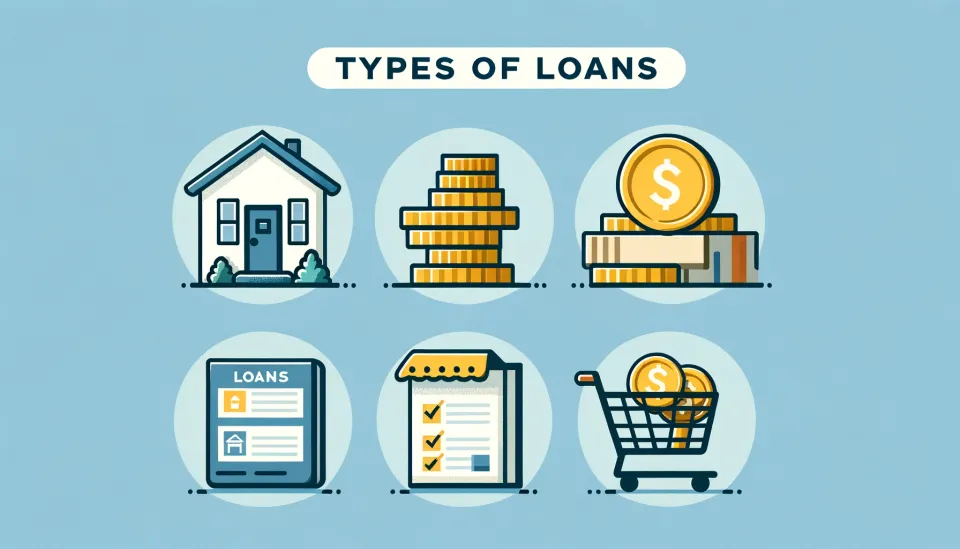Different Types of Loans Available in India

- In today's financial landscape, loans play an essential role in helping individuals and businesses manage their financial needs. Whether you're looking to buy a home, start a business, or cover unexpected expenses, understanding the various types of loans can help you make informed decisions. In this article, we will provide a detailed overview of different types of loans, their features, benefits, and ideal use cases.
Personal Loans:
- Definition: A personal loan is an unsecured loan that can be used for a wide variety of purposes, such as consolidating debt, making large purchases, or covering emergency expenses.
Key Features:
- Unsecured: No collateral is required.
- Fixed or Variable Interest Rates: The interest rate may be fixed for the loan's term or fluctuate depending on the lender.
- Flexible Repayment Terms: Repayment periods can range from one to seven years, depending on the lender.
- Loan Amounts: Loan amounts typically range from Rs. 50,000 to Rs. 50,00,000 (in India), or similar ranges in other countries.
Benefits:
- Versatile Use: You can use the funds for nearly any legitimate purpose.
- Fast Approval: Many lenders offer quick approval, with funds disbursed within 24 to 48 hours.
Ideal For: Personal loans are best suited for individuals who need immediate funds for personal expenses without pledging collateral.
Home Loans:
- Definition: A home loan, also known as a mortgage, is a secured loan specifically used to purchase a property, whether it be a house, apartment, or land.
Key Features:
- Secured Loan: The property itself serves as collateral.
- Long Repayment Terms: Home loans often have repayment terms ranging from 10 to 30 years.
- Low-Interest Rates: Since the loan is secured, lenders often offer lower interest rates compared to personal loans.
Benefits:
- Tax Benefits: Many countries offer tax deductions on home loan interest payments.
- Build Equity: With each mortgage payment, you build equity in your home.
- Low Down Payment Options: Some loan programs require as little as 5% down.
Ideal For: Home loans are ideal for individuals and families looking to buy or construct a home while spreading the payments over a long period.
Auto Loans:
- Definition: Auto loans are secured loans used to finance the purchase of a vehicle, be it a car, motorcycle, or other types of vehicle.
Key Features:
- Secured Loan: The vehicle itself is the collateral.
- Fixed Interest Rates: Auto loans typically come with fixed interest rates.
- Shorter Terms: Repayment terms usually range from three to seven years.
Benefits:
- Affordable Monthly Payments: The loan allows you to spread out the cost of the vehicle over time, making it more affordable.
- Lower Interest Rates: Secured nature of the loan results in lower interest rates compared to unsecured personal loans.
Ideal For: Auto loans are best suited for individuals looking to purchase a new or used vehicle with the flexibility of repaying over time.
Student Loans:
- Definition: Student loans are specialized loans designed to help students cover the cost of higher education, including tuition, books, and living expenses.
Key Features:
- Fixed or Variable Interest Rates: Interest rates can either be fixed or change annually.
- Deferred Repayment: Many student loans offer deferred repayment, meaning you don’t have to start making payments until after graduation.
- Federal and Private Options: Student loans are available through both government programs and private lenders.
Benefits:
- Low Interest Rates: Government-backed student loans often offer lower interest rates and more flexible repayment options.
- Flexible Repayment Plans: Graduates can choose from different repayment plans, including income-driven repayment options.
Ideal For: Student loans are designed for individuals pursuing higher education and who need financial assistance to cover tuition and other related costs.
Business Loans:
- Definition: Business loans are designed to help businesses finance operations, purchase equipment, or expand their ventures.
Key Features:
- Secured or Unsecured: Business loans can either require collateral or not, depending on the lender and loan size.
- Various Types: There are several types of business loans, including term loans, lines of credit, and equipment financing.
- Tailored Repayment Terms: Repayment terms vary depending on the loan type and amount, ranging from short-term to long-term financing.
Benefits:
- Support for Growth: Business loans allow companies to invest in their operations, leading to growth and expansion.
- Variety of Loan Options: Whether you need working capital or equipment financing, there is a loan to fit your business needs.
Ideal For: Business loans are suited for entrepreneurs and business owners looking to expand, purchase equipment, or manage cash flow.
Gold Loans:
- Definition: A gold loan is a secured loan where you pledge your gold as collateral to receive funds. The loan amount is determined by the value of the gold you pledge.
Key Features:
- Secured by Gold: Gold is held as collateral, and you can borrow up to a certain percentage of its market value.
- Short-Term Loan: Gold loans are typically short-term, with repayment terms ranging from three months to two years.
- Quick Processing: Gold loans are known for their fast approval and disbursal times.
Benefits:
- Low Interest Rates: Secured nature of the loan results in lower interest rates.
- No Credit Score Requirement: Since the loan is secured, lenders don’t typically require a high credit score.
- Flexible Use: Funds from a gold loan can be used for any purpose, including personal, business, or emergency expenses.
Ideal For: Gold loans are ideal for individuals who need quick funds and have gold assets that they can pledge as collateral.
Payday Loans:
- Definition: Payday loans are short-term, high-interest loans that are typically due on your next payday.
Key Features:
- High Interest Rates: Payday loans often come with extremely high interest rates.
- Small Loan Amounts: Loan amounts are usually small, often ranging from $100 to $1,500.
- Short Repayment Terms: Payday loans must be repaid within a short time frame, typically two weeks or less.
Benefits:
- Quick Approval: These loans are known for their fast approval process, with funds disbursed within hours.
- No Credit Check: Many payday lenders don’t require a credit check, making them accessible to borrowers with poor credit.
Ideal For: Payday loans are typically used by individuals facing a financial emergency and need immediate cash, though they should be used with caution due to high fees and interest rates.
Debt Consolidation Loans:
- Definition: A debt consolidation loan is used to combine multiple debts into one, allowing you to make a single monthly payment, often at a lower interest rate.
Key Features:
- Single Monthly Payment: Consolidate various debts into one manageable payment.
- Fixed Interest Rates: These loans often come with fixed interest rates, making it easier to budget for repayments.
- Varied Loan Terms: Repayment terms can range from one to seven years, depending on the loan amount and lender.
Benefits:
- Lower Interest Rates: Debt consolidation loans can help reduce the overall interest you pay on your debts.
- Simplified Finances: Having one monthly payment can make it easier to manage your finances.
Ideal For: Debt consolidation loans are ideal for individuals who have multiple high-interest debts and want to simplify their payments while potentially lowering their interest costs.
Credit Card Loans:
- Definition: Credit card loans, or cash advances, allow you to borrow against your credit card’s available credit limit.
Key Features:
- High Interest Rates: Credit card loans often have high interest rates compared to other loan types.
- No Collateral: These are unsecured loans, so no collateral is required.
- Immediate Access to Funds: You can access cash quickly, typically through an ATM or direct deposit.
Benefits:
- Convenient: It’s easy to access a cash advance if you have available credit on your card.
- No Application Process: You don’t need to apply for a separate loan, as the funds are available through your credit card.
Ideal For: Credit card loans are best suited for individuals who need immediate cash for short-term needs, though they should be used sparingly due to high fees and interest rates.
Conclusion:
- Choosing the right type of loan depends on your specific financial needs, whether it's buying a home, starting a business, covering an emergency, or consolidating debt. Each loan type offers unique features, benefits, and repayment terms, so it’s essential to evaluate your financial situation, creditworthiness, and the loan's purpose before making a decision. Borrowers should always read the fine print and fully understand the terms and conditions to avoid unexpected fees or challenges down the road.
FAQs:
What is the difference between secured and unsecured loans?
- Secured loans require collateral (e.g., a home or car), while unsecured loans do not. Secured loans typically have lower interest rates due to the collateral involved.
How do interest rates impact the cost of a loan?
- The interest rate determines how much you'll pay in addition to the loan amount over time. Higher rates increase the total cost of the loan, while lower rates reduce it.
Can I prepay my loan?
- Most loans allow prepayment, but some may have prepayment penalties. Always check with the lender before prepaying a loan.
What factors affect my loan eligibility?
- Factors like credit score, income, existing debts, and the type of loan all play a role in determining your eligibility.
How can I improve my credit score for better loan terms?
- Timely payments, reducing outstanding debts, and avoiding new credit inquiries can help improve your credit score, making you eligible for better loan terms.
What is the meaning of loan and its types?
- A loan is a sum of money borrowed that is expected to be paid back with interest. The main types include secured (backed by collateral), unsecured (no collateral required), personal, mortgage, auto, and student loans, each tailored to specific financial needs and credit situations.
What are the 2 main types of loans?
- The two main types of loans are secured and unsecured loans. Secured loans require collateral, such as a home or car, which the lender can seize if the borrower defaults. Unsecured loans do not require collateral and are based on the borrower's creditworthiness and ability to repay.
Which loan is cheaper?
- Secured loans (like, home loans) are generally cheaper due to lower interest rates, as they are backed by collateral.
What is the highest loan rate?
Average Overall Personal Loan Rates
- The average low rate for loans is approximately 11.00% to 10.98%.
- The average high rate for loans is around 30.62% to 30.47%.
- The highest loan rate observed is at an extreme of 99.99%.
- The lowest rate available for loans is recorded at 5.91%.
We hope that you like this content and for more such content Please follow us on our social site and YouTube and subscribe to our website.
Manage your business cash flows and payable/receivables using our Bahi Khata App




Comments ()